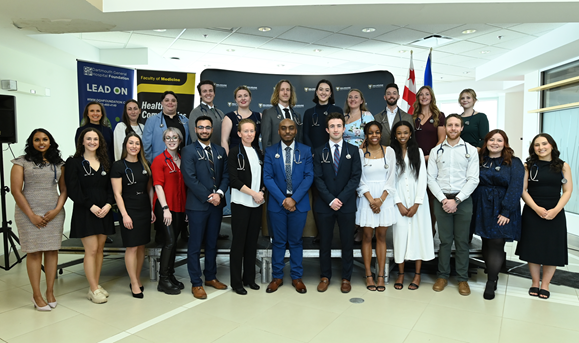Shaping the Future of Health Care
» Go to news mainDalhousie University's Master of Physician Assistant Studies Program

Dalhousie University's Faculty of Medicine has recognized the inaugural class in its groundbreaking Master of Physician Assistant Studies (MPAS) program at a special stethoscope ceremony.
Announced in 2023, this two-year program is the first in the Maritimes and provides students with the skills, knowledge, and training required to help them increase access to care and make a significant contribution to the health and wellbeing of Nova Scotians.
Marking the beginning of their journey into medicine, inaugural MPAS class members received their stethoscopes at an event where Dr. Kim Brooks, President and Vice-Chancellor of Dalhousie University, presided. The Honourable Brian Wong, Nova Scotia’s Minister of Advanced Education, Elder Ann LaBillois, faculty, staff, and family and friends were also in attendance at the February 15, 2024, ceremony.
“The Master of Physician Assistant Studies has come at a critical time when the health-care needs of Nova Scotians have never been greater,” said Dr. Brooks. “By providing a new pathway for health-care professionals to serve their communities, it is our hope that this program will help alleviate some of the burdens faced by our health-care system and ensure that patients receive the care they need.”
What is a physician’s assistant?
Physician assistants (PAs) are medical professionals capable of providing a wide range of health-care services under physician supervision. Originating in the United States in the 1960s, the first class of PAs in the Canadian Forces Medical Services graduated in 1984. Physician assistants have proven themselves invaluable assets in delivering safe, efficient, and quality health care.
Physician assistants can perform tasks ranging from patient assessment and diagnosis to treatment planning and surgical procedures, emerging as essential members of the health-care team.
Diwan Minocha, co-class president of the Class of 2025, is interested in how physician assistants can be a vital addition to an increasingly successful health-care system and plans to work in Nova Scotia upon graduation.
“The integration of physician assistants should be extremely positive on the health-care system especially in rural areas,” says Minocha. “The whole idea is to extend the scope of the physician to alleviate the strain on the health-care system as much as possible.”
The MPAS program at Dalhousie University is designed to provide students with comprehensive training in all aspects of clinical medicine. Through rigorous coursework and hands-on clinical experience, students will gain proficiency in pharmacology, surgical procedures, patient care, and more.
One of the distinguishing features of the program is its emphasis on practical training through clinical rotations in diverse health-care settings. From primary care clinics to emergency departments, students will have the opportunity to apply their knowledge and skills in real-world scenarios, preparing them for the challenges of modern health-care practice.
A surreal ceremony
 MPAS Class of 2025. (Photo: Danny Abriel)
MPAS Class of 2025. (Photo: Danny Abriel)
The stethoscope ceremony recognized the significance of the first class of MPAS students and how they will positively contribute to the health-care system in Nova Scotia.
“We have all worked very hard and come from very diverse backgrounds so receiving a stethoscope solidifying the fact that we are all going to be practising PAs in two years is surreal,” says Minocha.
The Dartmouth General Hospital Foundation donated the stethoscopes, which Minocha said the whole class appreciated.
“We could not be more grateful for this contribution from the Dartmouth General Hospital Foundation,” he says. “I would also like to thank the Nova Scotia Government, Nova Scotia Health, Dalhousie University, and so many others who have worked tirelessly to get this program off the ground, and to welcome the first class of physician Assistants in Atlantic Canada. I could not imagine the work that has gone into ensuring the success of this program, and of the students.”
Reflecting our communities
To ensure the physician assistant student body reflects the communities its members will serve, the Faculty of Medicine worked hard to ensure the equitable admission of Indigenous and African Nova Scotian people, who have historically faced barriers when applying to programs in the medical school. The new Indigenous Admissions and Black Learners Admissions pathways will increase admissions of these underrepresented groups, which in turn, will improve the health of Black and Indigenous communities in the province.
The MPAS program is currently accepting applications for the second cohort, beginning in January 2025.
Recent News
- Dalhousie and NCIME launch first‑of‑its‑kind program in Membertou First Nation
- A message from Wanda M. Costen, PhD, Provost and Vice President Academic
- Rhodes scholar Sierra Sparks returns home to study medicine
- President Kim Brooks, Dr. Pat Croskerry appointed to Order of Canada
- Dal’s Highly Cited Researchers reflect on influential global research alliances
- A New Bursary Supporting Black Medical Students at Dalhousie
- Dalhousie’s first physician assistant cohort steps into Nova Scotia’s healthcare system
- Dalhousie med students explore pediatric care in Austria
